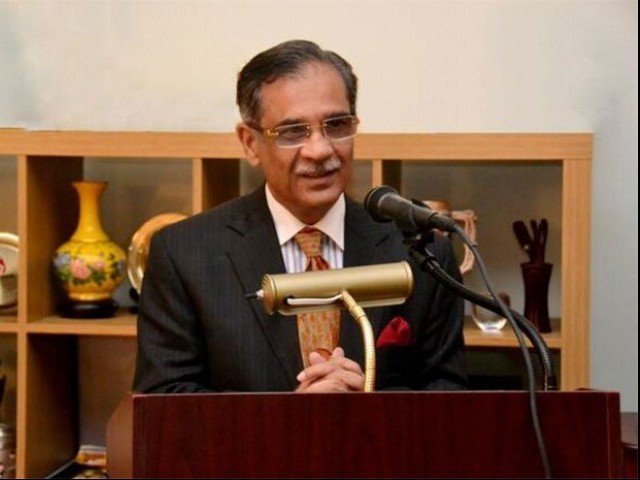
The Supreme Court’s three-judge bench, headed by Chief Justice Mian Saqib Nisar, on Thursday took notice of Dr Shahid Masood’s claims regarding Imran Ali, who allegedly abducted, raped and murdered 7-year-old Zainab in Kasur earlier this month.
The bench asked the Punjab police to investigate whether the accused, as claimed by Dr Masood, was actually working for some international group involved in child abuse.
Kasur abuse case: Zainab's ‘murderer’ remanded in police custody for 14 days
During the hearing, Dr Masood also appeared before the bench and said the accused was not a mentally ill person, but was part of a racket. He claimed that influential people, including a federal minister, were backing him. He expressed fears that the accused might be killed in police custody.
The chief justice observed that responsibility of the suspect’s security during police custody lied with the IG Punjab while the inspector-general of jails was responsible for his safety after judicial remand.
“If the claims made by the TV anchor have any substance, the prime suspect’s security is indeed a matter of concern,” the CJP said.
Kasur rape case: Murderer of 8-year-old Zainab arrested
The court asked the anchor to share the names of the prominent figures allegedly involved in the crime. The names would be kept confidential till the completion of the investigation, it added.
Dr Masood handed over a paper with the names of other suspects to the judges, who warned him of ‘grave consequences’ if the allegations were found incorrect. The case was adjourned till Monday, January 29.
Earlier, Punjab Additional Advocate General Asma Hamid informed the court that Punjab Chief Minister Shehbaz Sharif had also formulated a committee to investigate the disclosures made by the TV anchor. The CM also confirmed the development on social media.
A tale of two jacket buttons that led to arrest of Zainab’s murderer
“Following revelation of information reg[arding] bank accounts allegedly held by the accused in Zainab case, I immediately tasked [the] JIT to associate senior representatives from State Bank of Pakistan & DG Forensic Science Agency to inquire into issue & finalise the investigation accordingly,” he wrote.
Just a day before the expiry of the Supreme Court’s three-day deadline, the Punjab Police on Tuesday arrested the man, who allegedly abducted Zainab on January 4 and later dumped her body on a pile of heap garbage from where she was discovered on January 9.
While the Punjab government rejoiced over its success to nab the suspect through his DNA sample, apprehensions grew about whether the alleged suspect was truly the perpetrator of the heinous crime that shook the nation.
Breakthrough in Kasur case
Legal experts have said the DNA is an admissible evidence, especially in criminal cases, and that each case is dealt with differently depending on its nature. A Supreme Court judge in a case observed that it never ruled that DNA report is not admissible evidence.
Advocate Tariq Mahmood – who had appeared in a murder case before a three-judge bench of the Supreme Court, headed by judge Asif Saeed Khosa – told The Express Tribune that the court said on Thursday that it never ruled that DNA report is not admissible as every criminal case has different dimensions
“The dimensions of one case can be very different from another, and it cannot be argued that the DNA is not admissible in a court of law,” he said.
SC gives 72-hour deadline to nab Zainab’s killers
Advocate Chaudhry Faisal Hussain told The Express Tribune: “There is a judgment of the Peshawar High Court (PHC) which directed the police to conduct the DNA in every case.”
“A single-judge bench of the PHC in December ruled that it is mandatory to conduct the DNA tests on both the suspected rapist and his alleged victim in sexual assault cases,” he said.
Justice Roohul Amin Khan Chamkani ruled that under Section 164-B of the Code of Criminal Procedure, which was made into law through the Criminal Law Act 2016 (Amendment), dictates that samples of the DNA of both should be collected and sent for examination at the earliest.
IG police submits Kasur victim's autopsy report before SC
The bench ruled that Section 164-B CrPC related to conducting of DNA tests shall be applicable to offenses under Section 376 (Punishment for Rape) of the Pakistan Penal Code.
Legal experts also say that multiple cases have been investigated wherein DNA report has been considered as evidence.
Karachi-based lawyer Faisal Siddiqui told The Express Tribune that the 2013 rape case against Salman Raja (PLD 2014 SC) made DNA primary source of evidence.
However, Sidiqqui believes that “conviction cannot solely be based on DNA. There must be corroboration by other oral and other evidences as well.”
According to Islamabad Advocate General Mian Abdul Rauf, “The Punjab Forensic Science Agency (PFSC) was established under the law which provides that experts performing a function in the said agency are deemed to be experts themselves and their DNA reports will be admissible without calling the experts in witness box.”
Following revelation of information reg bank accounts allegedly held by the accused in Zainab case, I immediately tasked JIT to associate senior representatives from State Bank of Pakistan & DG Forensic Science Agency to inquire into issue & finalise the investigation accordingly pic.twitter.com/17S30OKhCz
— Shehbaz Sharif (@CMShehbaz) January 25, 2018
1718870162-0/BeFunky-collage-(60)1718870162-0-405x300.webp)
1730504285-0/Martha-(1)1730504285-0-165x106.webp)



1732340798-0/BeFunk_§_]__-(35)1732340798-0.jpg)











COMMENTS (3)
Comments are moderated and generally will be posted if they are on-topic and not abusive.
For more information, please see our Comments FAQ